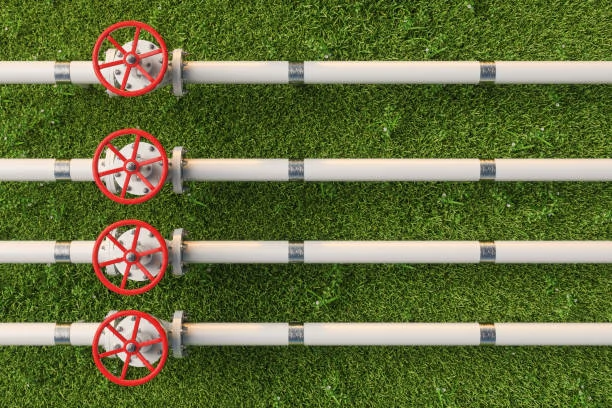Introduction to PPR Plumbing
PPR (Polypropylene Random Copolymer) plumbing systems have become a preferred choice in both residential and commercial settings. These pipes offer superior durability, heat resistance, and are known for energy efficiency and cost savings. When compared to traditional materials like copper or PVC, PPR systems help reduce energy consumption and long-term costs. Their ability to efficiently transport hot and cold water makes them ideal for various applications, particularly in energy-conscious projects.
Heat Retention Capabilities
One of the most significant advantages of PPR pipes is their excellent heat retention. Unlike metal pipes that lose heat quickly, PPR pipes maintain the temperature of the water for a longer period. This reduces the energy needed to reheat water in heating systems, leading to significant energy savings. For example, in a household with a central heating system, PPR pipes ensure hot water stays warm, minimizing the need to constantly heat water, which directly lowers energy bills.
Reduced Heat Loss in Insulation
PPR plumbing systems are designed with low thermal conductivity, which means they prevent significant heat loss during water transportation. This characteristic makes them more energy-efficient than metal pipes, which can lose heat rapidly. By reducing the amount of heat that escapes, PPR plumbing enhances the overall energy efficiency of any building. In cold climates, this feature is particularly valuable, as it helps conserve energy while maintaining consistent water temperatures.
Durability and Longevity
Durability directly influences cost savings. PPR pipes have a long lifespan, often exceeding 50 years. This reduces the need for frequent repairs or replacements, translating into significant cost savings over time. The material is resistant to scaling, corrosion, and chemical damage, which are common problems in other piping materials. For instance, buildings that experience hard water benefit greatly from PPR systems, as they do not corrode or degrade, unlike traditional copper or iron pipes.
Reduced Maintenance Costs
PPR pipes require minimal maintenance compared to metal or PVC systems. Their smooth internal surface prevents the buildup of scale and sediment, which can block water flow in other pipes. This helps in maintaining efficient water circulation and reduces the need for costly maintenance. For example, homeowners using PPR plumbing will experience fewer issues with blockages, thus lowering maintenance costs over time. Reduced maintenance needs directly contribute to long-term savings.
Energy Efficiency in Hot Water Systems
In systems that rely on the transportation of hot water, such as boilers or solar heating setups, PPR pipes are highly efficient. Their ability to reduce heat loss means that less energy is required to maintain the desired temperature. A typical commercial building that uses a solar water heating system will find that PPR plumbing minimizes energy wastage by retaining heat better than traditional pipes, ensuring lower energy consumption and more effective heating.
Eco-Friendly Benefits and Energy Savings
PPR plumbing is not only energy-efficient but also eco-friendly. The production of PPR pipes uses less energy than that of metal pipes, contributing to lower carbon emissions. Additionally, their recyclability reduces environmental impact. For example, in green building projects, PPR pipes align with sustainability goals by promoting energy efficiency and reducing waste. Lower energy consumption during manufacturing and their energy-saving properties make PPR pipes a sustainable choice for modern plumbing.
Conclusion: Maximizing Savings with PPR
Overall, PPR plumbing systems provide a combination of energy efficiency, durability, and cost-effectiveness. Their ability to reduce heat loss, retain water temperature, and require minimal maintenance makes them a top choice for any energy-conscious project. Whether in residential or commercial applications, PPR pipes offer long-term financial savings and contribute to a greener, more sustainable future. As buildings continue to focus on energy efficiency, PPR plumbing will remain a vital component in achieving these goals.
| Best PPR products Manufacturers | ||
| Companies | Headquarter/Location | Year Founded |
| IFAN | ZHEJIANG,CHINA | 1993 |
| RAKtherm | UAE | 1963 |
| REHAU | Muri bei Bern, Switzerland | 1948 |
| POLOPLAST | Leonding, Austria | 1954 |
| ERA | ZHEJIANG,CHINA | 1983 |
| LESSO | GUANGDONG,CHINA | 1986 |
The IFAN PPR piping system adheres to international standards, including ISO 15874 series, EN 15874 series, ASTM F2389, DIN 8077/8078, GB/T 18742 series, and NBR 15884.
Connecter
IFAN est un fabricant chinois de tuyaux, de raccords et de vannes en plastique, fort de 30 ans d'expérience. Si vous êtes intéressé par IFAN copper fittings, copper valves, plastic pipes and fittings, please contact us. IFAN offers you a variety of standard pipes to meet your specific needs. Click below to learn more about IFAN’s wide range of affordable and cost-effective valve products and piping system related products.
We will reply your email or fax within 24 hours.
You can call us at any time if there is any question on our production.
For more information,pls visit our webside https://ifanpro.com/
Veuillez envoyer un courrier à l'adresse suivante [email protected]
Whatsapp : + 86 19857948982














Commentaires récents